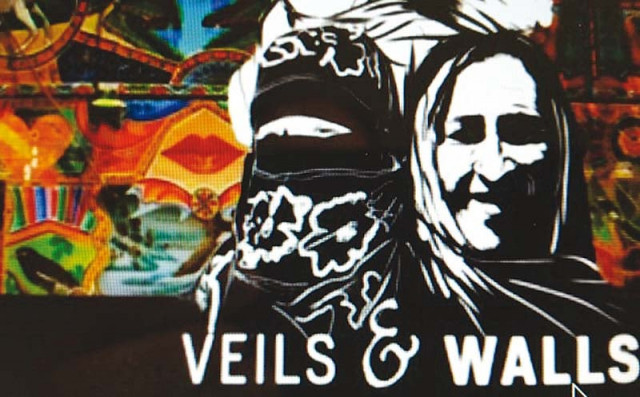Washington DC South Asian Film Festival: Where love and art collide
South Asian diaspora bond over cinema in North America

Huma Beg’s documentary Veils and Walls on rural women’s political activism in Pakistan.
A total of 14 features, 10 short films and one documentary each from India, Pakistan, the United States and Canada were screened at the three-day festival. “The main goal of DCSAFF is to provide a platform in the US capital to screen films from South Asian countries, and films made by South Asians in any place in the world that has cultural subjects,” says Festival Director Geeta Anand Singh in a recent conversation. DCSAFF screened its first Pakistani film, Lamha by Meher Jaffri in 2013, followed by Josh by Iram Parveen Bilal in 2014. “We seek latest and meaningful films from Pakistan and would love to have Pakistani sponsors support our festival, in kind or financially,” says Singh. This year, DCSAFF showed films such as Court (2014), India’s official entry for the 88th annual Academy Awards, directed by 28-year-old Chaitanya Tamhane; South Indian film-maker Anant Mahadevan’s Rough Book (2015); Bengali auteur Aparna Sen’s Saari Raat (2014) and premieres of Suman Ghosh’s Kadambari (2015) and Nitin Adsul’s Partu (2015). The festival also screened late director/actor of Raincoat fame Rituparno Ghosh’s 2012 film Chitrangada and late cinematographer Rajan Kothari’s Das Capital (2012), as a tribute to the legends. Director Shonali Bose’s Margarita with a Straw, starring Kalki Koechlin as a young rebel with cerebral palsy, screened at DCSAFF after a fabulous run at festivals around the world, including its North American premiere at the Toronto Film Festival in 2014.
 Immigration attorney Sheila Murthy, director/actor Sarmad Khoosat, Philanthropist Debbie Driesman with her husband Frank Islam and television host Nilima Mehra. PHOTO COURTESY: THE FOURTH WASHINGTON DC SOUTH ASIAN FILM FESTIVAL.
Immigration attorney Sheila Murthy, director/actor Sarmad Khoosat, Philanthropist Debbie Driesman with her husband Frank Islam and television host Nilima Mehra. PHOTO COURTESY: THE FOURTH WASHINGTON DC SOUTH ASIAN FILM FESTIVAL.Pakistan’s Manto (rough cut) was an apt fit in an exciting repertoire of Indian Parallel Cinema and contemporary independent cinema, with its history of cerebral, sensitive fare and realistic, issue-based film-making that gets international recognition at film festivals around the world. “To see Sarmad Khoosat in all his youthful humility and his unassuming and honest portrayal of Pakistan’s most prolific short story writers, highlighted how times are truly changing for Pakistani artists and intellectuals,” says Dr Maliha Ilias, a Washington DC resident who went to see the film. “Manto, the writer, didn’t put much stock into boundaries and limits. Neither should we.”
Khoosat was also part of a director’s roundtable discussion at DCSAFF titled ‘Understanding Identity and Socio-Political Norms through South Asian Films’ along with Bengali film director Suman Ghosh, renowned film-maker and actor Aparna Sen, who is also known in her other avatar as Konkona Sen Sharma’s mother, and actor/producer Vivek Vaswani. The discussion was moderated by Dr Kiran Pervez, the South and Central Asia chair at the Foreign Service Institute, US Department of State. “Sarmad Khoosat is well aware, and sensitive to the changing nature of the Pakistani film industry,” observes Naghmana Khan, an energy management analyst in Washington DC, who attended the session as an audience member.
The jury at DCSAFF gave Pakistani cinema due accolades with a Special Appreciation Award for Beg’s documentary Veils and Walls about the impact of rural women on the Pakistani electoral process, and Sarmad Khoosat received a special Award for Contribution to Pakistan TV and Films.
Miss Pakistan USA (2015) Sarish Khan and Ex Ms World Pakistan (2012) Zanib Naveed were also invited to grace the red carpet event this year.
 Directed by Sarmad Khoosat in a biographical drama film based on the life of Pakistani short-story writer Saadat Hasan Manto.
Directed by Sarmad Khoosat in a biographical drama film based on the life of Pakistani short-story writer Saadat Hasan Manto.Pakistani talent and subjects also made their mark early September this year at the Toronto International Film Festival (TIFF) where Sharmeen Obaid-Chinoy presented her documentary A Journey of a Thousand Miles: Peacekeepers, which she co-directed with Indian film-maker Geeta Gandbhir. Actor Ali Kazmi starred in Canadian director Deepa Mehta’s Beeba Boys, and director Davis Guggenheim’s intimate portrait of Malala Yousafzai, He Named Me Malala also screened at TIFF before its international release in October.
Manto (rough cut) went Ivy League when it screened at the Harvard-Brown Pakistani Film Festival 2015 in October, founded and coordinated by Mustafa Samdani, Research Assistant at Harvard University’s South Asia Institute, and co-curated by Pakistani academics Asad Ahmed at Harvard University and historian Vazira Zamindar at Brown University. In discussions at the festival, film-makers, academics and the audience pored over the revival of Pakistani cinema, which Khoosat preferred to call ‘rejuvenation’ of an already existent cinema culture, where now films are coming out in their new avatars.
As cinema grows in Pakistan, one hopes many upcoming films will go to international film festivals and South Asian diaspora film festivals with the support of the Pakistani community, especially in the US, the UK and Canada.
Amna R Ali is a freelance journalist who writes about arts and culture. She tweets @Amna_R_Ali
Published in The Express Tribune, Sunday Magazine, November 22nd, 2015.



















COMMENTS
Comments are moderated and generally will be posted if they are on-topic and not abusive.
For more information, please see our Comments FAQ